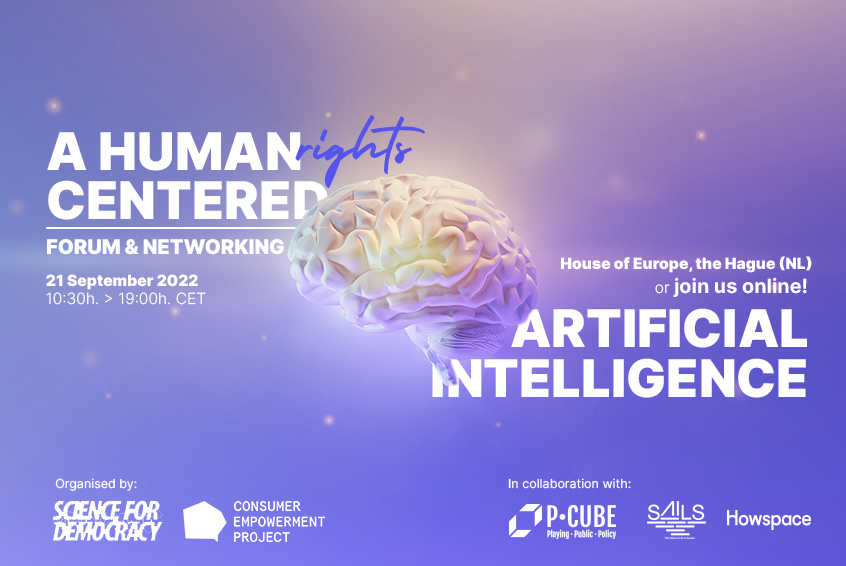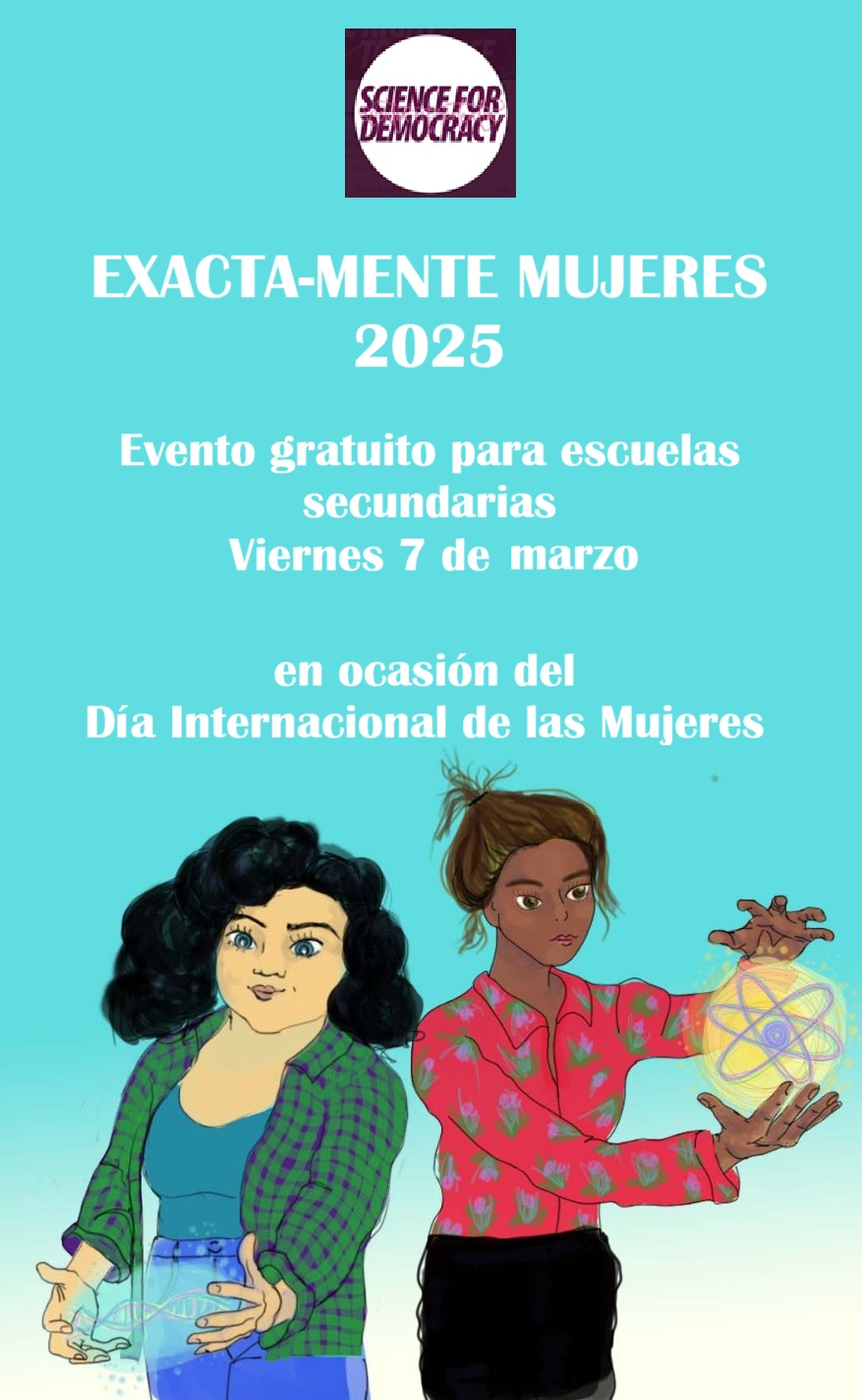
Science for Democracy organizes a public forum to discuss the impacts of Artificial Intelligence on the life of EU citizens, followed by a networking event with the Italian Scientific Community in the Netherlands.
Below you can find:
– The background information
– The detailed programme of the event “A Human (Rights)- Centered AI”
– The details of the networking event
– The information on the partner organisations
Below you can watch the recorded version of the event, and the slides used during the different sessions can be found at the bottom of this page.
****
Background
In April 2021, the European Commission published a proposal for a new EU Artificial Intelligence (AI) regulation, differentiating the AI uses and the risks they might pose to individuals’ privacy and fundamental rights. AI technologies bring social benefits across multiple sectors, including precision medicine, public administration, sustainability and gender equality. These technologies can increase the accuracy of forecasts and help develop more inclusive services for the well-being of EU citizens, but they also pose a risk to their privacy, security and Human Rights if not strictly regulated.
The event will aim to think and discuss the impact of AI in a scenario of uninformed citizens, unable to safely and concretely act with this emerging technology, by connecting EU policymakers, members of civil society organizations, representatives of the business sector and academics working on the matter.
Objectives
- Final Proposal: a blueprint document to be used to address EU Institutions and which will highlight essential guidelines for Human Rights centered design of AI solutions;
- Networking: bringing together participants from different backgrounds such as policymakers, members of civil society organizations, experts from the private sector, and academics;
- Science Communication: a forum to exchange knowledge and inform societal actors on AI and its development in relation to the right to science.
PROGRAMME
10.30-16.45 | A HUMAN (RIGHTS) CENTERED AI DESIGN
Where: House of Europe Korte Vijverberg 5, 2513 AB The Hague, Netherlands. Maximum capacity for in-person attendance is 50 people.
10.30 Opening remarks by Marco Scialdone, CEP Project Leader, and Marco Cappato, co-founder Science for Democracy, and Ambassador Giorgio Novello.
10.45-11.45 Initial session on AI and its interdisciplinary challenges with the perspectives of academics, civil society, policymakers and the private sector
With:
Marc Rotenberg, Founder & President Center for AI and Digital Policy (CAIDP)
Kim Van Sparrentak, MEP Greens and Shadow Rapporteur for the Artificial Intelligence Act
Kai Zenner, Head of Office & Digital Policy Advisor to MEP Axel Voss
Irina Orssich, Head of Sector – AI Policy Development and Coordination at the European Commission
Facilitator:
Antonella Succurro, Scientific Officer, West German Genome Center Bonn and member of Science for Democracy
12.00-13.15 Public policies and Human Rights
Interactive session with P-Cube Playing Public Policy educational game to understand the layers of actions, strategies, and methodologies for impacting the decision-making process on artificial intelligence regulations and impact of Facial Recognition Technologies in the framework of Human Rights starting from the experience of the European Citizens Initiative “Reclaim Your Face”.
With:
Ella Jakubowska, Policy Advisor at European Digital Rights (EDRI) and coordinator of the European Citizens Initiative “Reclaim Your Face”
Gaia Taffoni, Research & Teaching Associate at the School of Transnational Governance and member of Science for Democracy
13.30-14.30 Light lunch break
14.30-16.00 Roundtable with online and offline interaction to produce a set of recommendations that will be included in the final documents
Areas of focus will be:
- Open Data and Data Protection;
- AI and Health;
- AI and Democracy.
With:
- Klaus Heine, Professor of Law and Economics at the Erasmus School of Law in Rotterdam
- Isabelle Hupont Torres, Scientific Project Officer at the Joint Research Centre (HUMAINT project)
- Sascha Marschang, Senior Advisor at European Hospital and Healthcare Federation
- Giralda Chiverton, Regional Lead with Howspace
- Federica Paolucci, Ph.D Student at the Bocconi University in Milan
Facilitator:
Franco Donati, Researcher in Industrial Ecology at Leiden University and member of Science for Democracy
16.00-16.15 Coffee break
16.15-16.30 Presentation of the key takeaways from the sessions with Virginia Fiume, coordinator of European initiatives Science for Democracy and co-president of EUMANS and Marie Ronsmans, Project Officer at Science for Democracy
16.30-16.45 Conclusive remarks by Marco Cappato, co-founder of Science for Democracy and Claudia Basta, Scientist and member of Science for Democracy
******
17.30-19.00 | NETWORKING MEETING WITH THE SCIENTIFIC COMMUNITY
Format
As a public event, the event will facilitate discussions between EU policy makers, members of civil society organizations, representatives of the business sector and academics; with the clear aim to produce a set of recommendations for the EU Institutions for a Human Rights-centered design of AI solutions. Speakers and participants will be asked to contribute to the drafting of this document and provide comments on the final proposals issued by the event.
*****
This event is organized by Science for Democracy. Science for Democracy is a platform that connects academics, policy makers and civil society organizations for the promotion of the “Right to Science”.
It is part of the Consumer Empowerment Project, funded by Euroconsumers and Google, which aims to improve the digital ecosystem for consumers and help consumers understand their rights so that they can make better informed decisions.
Supported by Leiden University SAILS (Society Artificial Intelligence and Life Sciences), a university-wide initiative aiming to facilitate collaboration across disciplines on the use of Artificial Intelligence.
In collaboration with the P-Cube project, which aims to help people learn how decisions are taken in the public sphere by covering the individual elements of the policy-making process, placing special emphasis on non-incremental policy change.
The event is powered by Howspace, an Artificial Intelligence online platform that helps organizations develop their culture and transform their practices.



